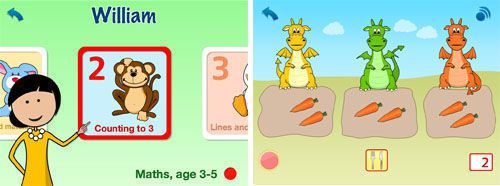Lost in translation: making sense of maths
Reading Nat’s post about all the fascinating linguistic differences and difficulties that she and her translators experienced when translating the new uTalk app, I was reminded of some of the similar issues we’ve had in localising the maths apps. What seems totally normal to a three-year-old in the UK might not be all that familiar to a kid in Malawi, for a start! Not to mention the fact that (unfortunately for us English speakers), not all languages follow our grammar rules. Here are a few of the cultural and language localisation issues we’ve come across recently…
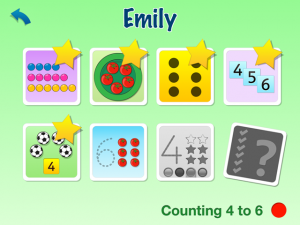 In Swedish, there were a couple of interesting language differences, for example: you cannot use the same word for ‘height’ in Swedish for an object such as a house as for a person (Välj det Längsta barnet – choose the tallest child, but Välj det högsta trädet – the tallest tree), whereas in English we can say short or tall regardless of the object.
In Swedish, there were a couple of interesting language differences, for example: you cannot use the same word for ‘height’ in Swedish for an object such as a house as for a person (Välj det Längsta barnet – choose the tallest child, but Välj det högsta trädet – the tallest tree), whereas in English we can say short or tall regardless of the object.
In Malawi, some of the ‘everyday’ objects featured in the apps probably seemed more than a little strange. In fact, Chichewa is strongly based on words for things that people see and encounter in daily life. Our translator had to get a bit creative and come up with ‘equivalent’ names for objects such as a robot (a doll in the Chichewa version), a turnip (a potato in the app), a dragon (she had to use a description meaning ‘a fierce animal’) or a fridge (replaced by a cupboard). There are also many more ‘technical’ words which don’t exist in traditional Chichewa, such as shapes. These are therefore normally given English names with a slight Chichewa accent (sikweya, trayango, rekitango and so on).
This is quite similar in Wolof: many items simply do not have a name in Wolof, or the words are unfamilar to most young people. Many items are therefore named in French instead, such as animals (giraffe), shapes (cercle) or fruits (banane). Above about 10, Wolof-speakers also tend to revert to French numbers instead of the more complex Wolof system (similar to the Chichewa – 5 and 1, 5 and 2…).
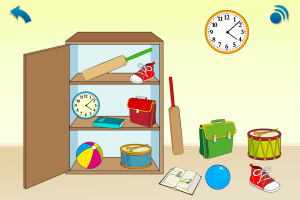 As with the uTalk app, Polish proved an especially problematic language for us too. One of the biggest issues was that in Polish the word for ‘you’ is dependent on gender. The translator mainly dealt with this by saying ‘we’ (e.g. Nauczyliśmy się/robiliśmy – we learned/were learning how to…), rather than addressing the child playing the app as male or female. It is also not usual to use prepositions such as ‘inside’ and ‘outside’ when describing the location of an object. e.g. instead of saying ‘the book is outside the cupboard’, Poles would normally say ‘the book is not in the cupboard’. Similarly to many other languages, some of the objects were also not very familiar: a cricket bat is not a well-known object, so it was translated as kijek – a little bat, and mangoes were translated as owoce – a fruit, as mangoes are not a ‘usual’ fruit in Poland – the same was the case with the Hungarian app, where we translated mango as gyumolc – also a generic word for fruit.
As with the uTalk app, Polish proved an especially problematic language for us too. One of the biggest issues was that in Polish the word for ‘you’ is dependent on gender. The translator mainly dealt with this by saying ‘we’ (e.g. Nauczyliśmy się/robiliśmy – we learned/were learning how to…), rather than addressing the child playing the app as male or female. It is also not usual to use prepositions such as ‘inside’ and ‘outside’ when describing the location of an object. e.g. instead of saying ‘the book is outside the cupboard’, Poles would normally say ‘the book is not in the cupboard’. Similarly to many other languages, some of the objects were also not very familiar: a cricket bat is not a well-known object, so it was translated as kijek – a little bat, and mangoes were translated as owoce – a fruit, as mangoes are not a ‘usual’ fruit in Poland – the same was the case with the Hungarian app, where we translated mango as gyumolc – also a generic word for fruit.
In Portuguese, there is no real way to distinguish between ‘more’ and ‘most’ or ‘less’ and ‘least’. Mais means both more and most, and menos less/least/fewer/fewest. This is also the case in Welsh: ‘bigger’ and ‘biggest’ translate to mwy and mwyaf respectively, but ‘more’ and ‘most’ also translate to mwy and mwyaf. The same goes for ‘smaller’/’smallest’ and ‘less’/’least’ (llai, lleiaf). On the other hand, there are different words for top and bottom shelves. Generally ‘top’ and ‘bottom’ are top and gwaelod but ‘top shelf’ and ‘bottom shelf’ are silff uchaf and silff usaf.
I was also intrigued to find out that in Amharic (an African language spoken in Ethiopia), they have a completely different system for telling the time: ‘1 o’clock’ does not mean lunch time, it in fact means ‘the first hour of the day’, i.e. when the sun comes up, and the rest of the day is counted from there. In fact, “Telling the time’ has been one of the hardest topics to localise, as our ideas of what happens at what time are not exactly international. Our French translator not only found the idea of eating a boiled egg for breakfast rather funny, but also pointed out that schools finish at 5 in France, not 3 as in the app, and a child would eat dinner at 7 or 8, not at 5 or 6! In Spain this is even funnier, as Spanish children regularly eat their dinner at 9 p.m., and go to sleep at 10 p.m. or perhaps later at the weekend or on holiday.
These are just a few of the language and cultural issues we’ve encountered on the maths translation project, and there are sure to be more! We have 10+ new languages ready to be released, and many more in the pipeline, so watch this space!
Alex
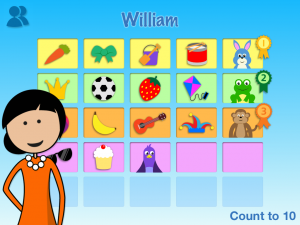 The maths apps are available from the App Store: Maths, age 3-5 and Maths, age 4-6.
The maths apps are available from the App Store: Maths, age 3-5 and Maths, age 4-6.
And also now available (in English only for the time being), Counting to 10, our first maths practice app, is on sale in the iTunes App Store for iPhone, iPod touch and iPad, and Google Play, for Android devices.
The benefits of exposing younger children to multiple languages
Today we have a guest post by Stephen Thomas, on behalf of Pearson PTE, on why it’s important to expose children to other languages at a young age.
Why expose children to other languages?
Communication is fundamentally part of what makes us unique organisms on earth. The way that we have developed language to exchange concepts, ideas, narratives and so on with sounds that are culturally recognised to the degree of complexity we have, is distinctive and unmatched by any other organism.
Clearly then, learning a language reaps obvious benefits: we can learn and understand new things with ease, retain ideas throughout decades, make each other laugh and cry, discuss, debate and develop the most fundamental questions of philosophy – all through using just one language. So aside from the want or need to communicate with speakers of a different language, is there any benefit of being bilingual or raising children that are bilingual? Well, Pearson PTE spoke with Dr Catriona Morrison, senior lecturer in psychology at The University of Leeds who advised that there is evidence to support the notion that merely exposing children under the age of five to other languages has benefits, regardless of whether or not they become bilingual.
Between the age of 3 and 6 is a vital stage of childhood in terms of language learning and development. The malleable mind of a child
at this age is like a sponge and Dr Morrison advises that “after the age of five, it is highly unlikely to acquire the mother tongue of a language if it is not yet already acquired”. Although in later childhood or adult life we may learn a new language, we can be sure that we do not learn it with anything like the same ease that we would as a child. After this crucial point in child development there begins a change in the human brain that effectively shuts down the ability to ‘naturally’ learn language. Of course that doesn’t mean you can’t learn a language in adulthood, but if you have, I’m sure you will agree that it is much more difficult in contrast to a truly bilingual person (who learned two languages before this crucial stage) whereby the two languages are seamlessly managed within the brain as though they were one.
Beyond the communicative advantages, research suggests that bilingual children have better capacities for storytelling and interpretation. The processing of information seems to happen at a deeper level and they will think through and into the story more. So for example, statistically if we were to take a group of monolingual children and a group of bilingual children and tell them a story, when we ask them to recount the narrative and characters, the bilingual children will show evidence of deeper understanding and a higher level of information processing.
Furthermore, Dr Morrison suggested that bilingualism seems to act as a preventative mechanism against the onset of dementia or Alzheimer’s disease. Although it will not create immunity and one may still fall to the condition, statistically if it is going to happen it will happen later in life, when compared to monolingual sufferers. In layman’s terms this could be because one is using more of the brain when accessing two or more languages and thus the brain is more active, and an active mind is a healthy mind.
How can we help children to discover languages?
So if you are a monolingual parent and you see the benefits of bilingualism in younger children, how should you go about helping your child? Realistically, a child of monolingual parents isn’t going to become bilingual, even with partial immersion in other languages through accessing foreign television radio or sending them to a nursery that caters for multiple languages. This is why Dr Morrison agrees that it is such a tragedy that the UK’s schooling system doesn’t introduce children to other languages as it is at this vital time of youth that we have the change to expand their minds in a way that isn’t possible at any other stage of life.
However, this doesn’t mean that the exposure is pointless or irrelevant: “I have a lot of faith in the idea that the more languages a child is exposed to, the better,” says Dr Morrison. Part of what makes language learning hard is that a new language draws on an entirely alien phonemic inventory to what we are used to hearing. When we try to listen to and learn these sounds, our brain simply isn’t accustomed to hearing them. So there is definitely a benefit for parents endeavouring to expose children to these sounds that they would otherwise be starved of and therefore selectively excluded from the brain; absolutely do allow your children to watch foreign TV shows or listen to internet radio form other countries and if possible encourage human interaction with your child and other language speakers. This will only help and bolster their learning and development.
Stephen Thomas
If you’d like your children to start learning a language, why not try our Vocabulary Builder program? With its colourful characters and fun games, it’s a great start for young learners – and it’s available in over 100 languages.
Utility versus Beauty
Cristina Mateos is our Catalan intern here at EuroTalk, working on translating and recording our maths apps. In her blog post she explores a reason for learning languages that is often forgotten.
Utility versus Beauty.
Utility: Hammers, zips, kettles, light bulbs, electricity, mobile phones.
Beauty: Handwritten postcards, dawns, coffee smell, lovers looking into each others’ eyes, handknitted scarves.
 The world where I live stores useful belongings in closed wardrobes and turns on the radio so as not to listen to the silence around. As a Spanish teacher, I sell my courses by reminding these ‘utility users’ of the fact that 500 million people speak Spanish around the world. It is therefore extremely practical to be able to communicate in this language and to display that knowledge (especially if it comes with an official certificate) on one’s résumé. And I really believe that… and I am more than pleased with zips and light bulbs. But I feel sorry for the dawns. I feel sorry for the dawns and for language learners turning into language users. I would like my students to be able to ask for directions in Sevilla, complete a business deal with a big enterprise in Buenos Aires or get a train ticket in any Spanish train station, but I also want them to be fascinated by the beauty of my language.
The world where I live stores useful belongings in closed wardrobes and turns on the radio so as not to listen to the silence around. As a Spanish teacher, I sell my courses by reminding these ‘utility users’ of the fact that 500 million people speak Spanish around the world. It is therefore extremely practical to be able to communicate in this language and to display that knowledge (especially if it comes with an official certificate) on one’s résumé. And I really believe that… and I am more than pleased with zips and light bulbs. But I feel sorry for the dawns. I feel sorry for the dawns and for language learners turning into language users. I would like my students to be able to ask for directions in Sevilla, complete a business deal with a big enterprise in Buenos Aires or get a train ticket in any Spanish train station, but I also want them to be fascinated by the beauty of my language.
Los rinocerontes no pueden leer. This is probably the most pointless sentence ever, unless you meet a woman crying in disappointment because a rhino isn’t answering her love letters, and you find it necessary to clarify for her that rhinos cannot read. But the sentence itself: its sonority, the combination of the ‘e’ letters together, the way grammar is used in it, the choice of the masculine gender instead of the feminine… it moves language away from usefulness and places it closer to poetry. Don’t you find it amazing how it’s possible to play with a language and build nonsense sentences? Making up words – and this is something, as language learners, that we constantly do when trying to refer to concepts we don’t know the name for – just by using common lexical rules? (Like The mugness of a morning, or This dog is so killable when it starts barking in the middle of the night.) Have you ever fallen in love with a word in your own language just because of the way it sounds, as if it were a piece of music with no meaning at all apart from the feelings it causes for you? If not, I can suggest one in English that I love: wibble. And I can provide one in Spanish too… barítono. Beautiful as a handknitted scarf.
Let me come back to the point. As a Catalan speaker, I feel also sorry for my second first language. Catalan has been left apart so many times in the name of utility that too often I need to make a real effort to keep on using it. I have been told that Spanish is more practical. More and more parents in non-English speaking countries choose a school for their children taking into account nothing but the number of hours their children are going to be taught English, because English (and now probably also Chinese?) is the Future.
Then, in Utility’s name… we can close small shops and open more and more supermarkets. We can burn poetry books and publish more instruction manuals. We can forget about nice roasts and pies and cheesecakes, and ingest vitamins and protein pills every morning.
But if, like me, you feel sorry for the dawns, then learn another language.
Cristina
So, did you know you can speak Greek?
Today’s blog post is written by Konstantia Sotiropoulou, who’s been helping us to translate and record our Maths apps in Greek.
I bumped into the picture below a while ago and I thought this should be interesting. Undoubtedly, Greek is one of the richest languages in the world and is distinguished by an extensive vocabulary. In the past, the Guinness Book of Records ranked the Greek language as the richest in the world with 5 million words and 70 million word types!
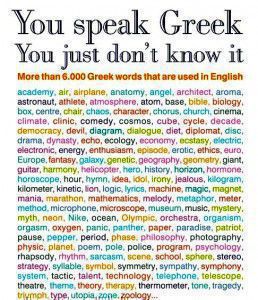
The front cover of You speak Greek, You just don't know it, a book by Annie Stefanides (Ianos, 2010)
Well, many of these words have been widely borrowed into other languages, including English. Greek roots are often used to coin new words for other languages, especially in the sciences and medicine. Mathematics, physics, astronomy, democracy, philosophy, athletics, theatre, rhetoric, baptism and hundreds of other words are Greek. Moreover, Greek words and word elements continue to be productive as a basis for coinages: anthropology, photography, telephony, isomer, biomechanics, cinematography, etc. and form, with Latin words, the foundation of international scientific and technical vocabulary, e.g. all words ending with –logy (“discourse”). Interestingly, an estimated 12% of the English vocabulary has Greek origin. Greek has contributed to English in several ways, including direct borrowings from Greek and indirectly through other languages (mainly Latin or French).
In a typical 80,000-word English dictionary, about 5% of the words are directly borrowed from Greek; this is about equivalent to the vocabulary of an educated speaker of English (for example, “phenomenon” is a Greek word and even obeys Greek grammar rules as the plural is “phenomena”). However, around 25% are borrowed indirectly. This is because there were many Greek words borrowed in Latin originally, which then filtered down into English because English borrowed so many words from Latin (for example, “elaiwa” in Greek evolved into the Latin “oliva”, which in turn became “olive” in English).
Greek and Latin are the predominant sources of the international scientific vocabulary. Greek is often used in coining very specialized technical or scientific words, however, so the percentage of words borrowed from Greek rises much higher when considering highly scientific vocabulary (for example, “oxytetracycline” is a medical term that has several Greek roots).
In education, an excellent way to build vocabulary is teaching students how to find roots in words. Since many words have their base in the Greek language, beginning with the roots from this ancient language is a good place to start. This list of English words with Greek origin will give students a basis for further exploration into the roots of the English language.
Now you that you have seen how many Greek words you know, I am going to teach you some more common ones like “kalimera” which means “good morning”, “Ya sou” which means “hi”, “Me lene” which means “my name is” and “efharisto” which means “thank you”. And if you are interested in learning more and discovering how many you already know, try EuroTalk’s uTalk Greek app.
And who am I to be talking about the Greek language? I am the Greek intern of EuroTalk, who translated and recorded into Greek their new Maths apps for young children. An interesting and fun experience for a young translator like me. I have to say that I really enjoyed working in this office, which gives you the sense of a family home. People here are calm and friendly, the kitchen is fully equipped with all kinds of snacks and during the day we get to listen to nice music while working! How amazing is that?
I started towards the end of January by translating the scripts of the app and soon after I recorded the first topics. I caught myself playing the app more than I needed to, as the games are really fun! I am sure young kids will truly enjoy it while learning basic Mathematics rules. And I know that my three-year-old niece, who will be playing the app in a few weeks, will at least have a constructive and educational first contact with technology!
So, whether you want to take up a new language or help your child have a nice start with Maths, you know that EuroTalk is here for you!
* There is an interesting video on YouTube that explains the History of English and the influence that it had from other languages!
Konstantia
A feast of languages: Shakespeare as we’ve never seen it before
Last Monday, 23rd April, was the 448th anniversary of the birth of William Shakespeare, and marked the launch of Globe to Globe, a series of Shakespeare’s plays performed over six weeks in 37 different languages at the Globe Theatre on London’s South Bank.
On Monday, Troilus and Cressida was performed in Maori by New Zealand’s Ngakau Toa theatre company. Tonight the audience will watch A Midsummer Night’s Dream in Korean. If that doesn’t appeal, how about The Taming of the Shrew in Urdu, Macbeth in Polish or The Merchant of Venice in Hebrew?
 Even though I don’t speak any of those languages, I’m quite tempted to go along. Not only is this probably a once in a lifetime opportunity, but I’m intrigued to see how the plays will translate. Even for a native English speaker, Shakespeare’s language is not always that easy to understand, so is there a possibility that by watching a play and having literally no idea what’s being said, I could just be putting myself in for a couple of hours of mind-numbing boredom?
Even though I don’t speak any of those languages, I’m quite tempted to go along. Not only is this probably a once in a lifetime opportunity, but I’m intrigued to see how the plays will translate. Even for a native English speaker, Shakespeare’s language is not always that easy to understand, so is there a possibility that by watching a play and having literally no idea what’s being said, I could just be putting myself in for a couple of hours of mind-numbing boredom?
Well, possibly, but I suspect not. Just as an opera can still move an audience who doesn’t speak Italian, the point that’s being made with this festival is that Shakespeare’s themes and the emotions he portrays are so universal, they can be shared with an audience almost without words. The Globe website describes it best: ‘Shakespeare is the language which brings us together better than any other, and which reminds us of our almost infinite difference, and of our strange and humbling commonality.’ Perhaps Shakespeare didn’t anticipate that his work would one day be portrayed through a haka (the warrior dance best known outside New Zealand as the pre-match rugby ritual), but does that make it any less valid?
A couple of weeks ago, I watched a fantastic performance of Henry V by the Propeller Theatre Company. A whole scene of the play takes place in French, a language I don’t speak and which I’m pretty sure a lot of people in the theatre didn’t either. And yet – we all reacted in the same way at the same time to what we were seeing. If you’d asked me afterwards to translate every word the character was saying, I wouldn’t be able to. But I can tell you why it was funny.
Whether I could make it through a whole play is another question – but there’s only one way to find out! Now the tough part – which play to go for…? Any suggestions?
Liz


